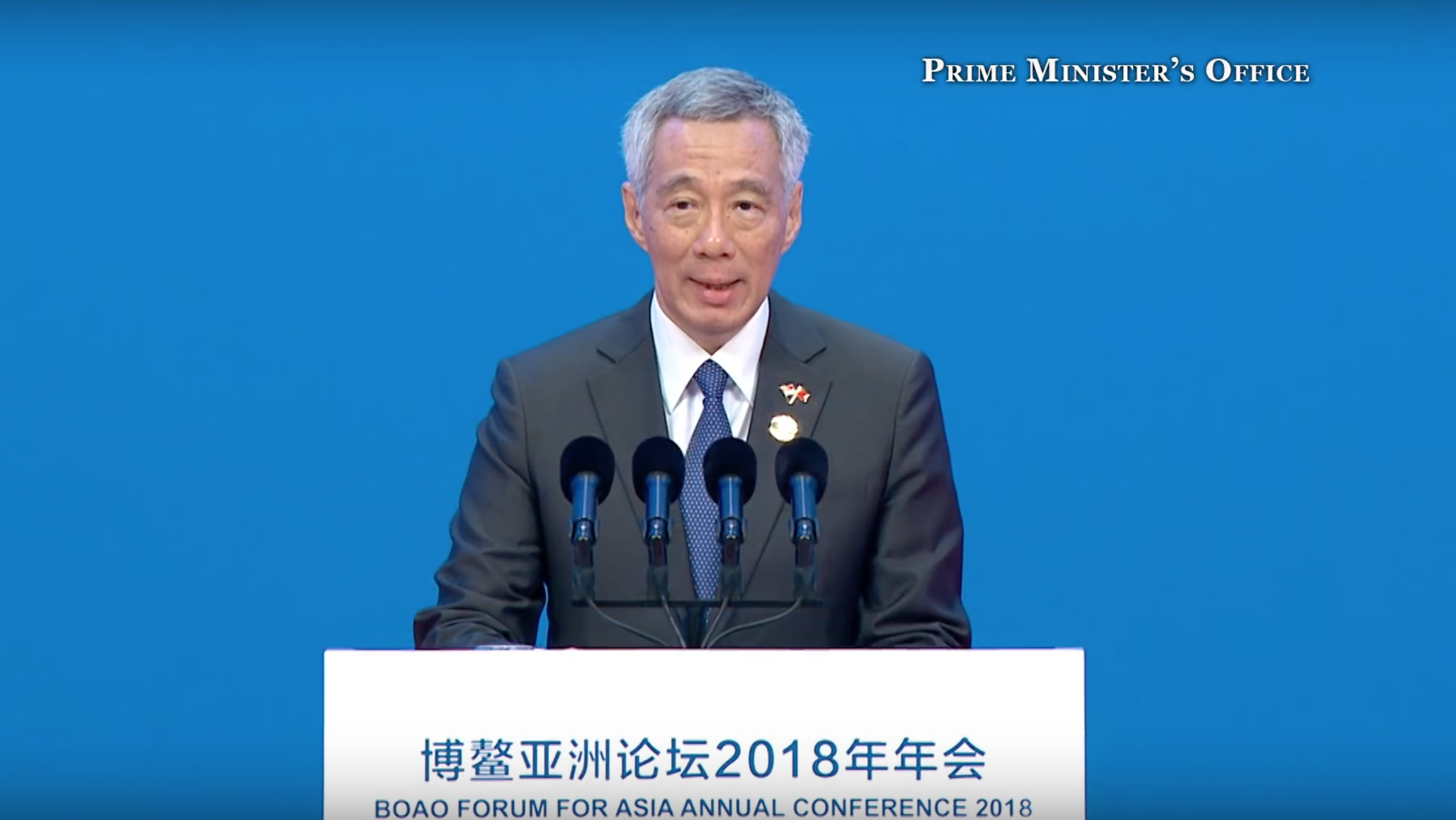Prime Minister Lee Hsien Loong was one of the state leaders who spoke at the opening ceremony of the Bo'ao Forum for Asia on Tuesday, April 10, 2018.
The Bo'Ao Forum for Asia, which takes place in the coastal city of Qionghai in Hainan province, is widely seen as China's answer to Davos.
His speech focused on China's role in the world and the potential consequences for all should the ongoing trade spat escalate to a trade war.
PM Lee is currently in China for a five-day visit until April 12.
Here are the highlights of his 11-minute speech:
1. China's increasing role in the global economy
PM Lee acknowledged China's growing role in the global economy, saying that he is "very glad to hear" President Xi Jinping reaffirm China's commitment to contribute constructively to the multilateral trading system.
He said:
"China's role in the international economy will grow larger, and the overall strategic balance has shifted.
And this has raised expectations from other countries on what China should do, to liberalise its markets further, and contribute to the multilateral trading system.
Indeed China itself recognises that it has been a major beneficiary of globalisation and will lose out if the existing multilateral rules-based system falters."
2. Washington and Beijing should resolve their dispute under World Trade Organisation rules
He also took the chance to reiterate Singapore's position on the ongoing trade spat between China and the US, saying that he does not believe that "imposing unilateral tariffs is the correct solution".
This is because unilateral actions are "not compliant with WTO rules".
He also said that the "focus of the bilateral trade imbalance between the US and China is misplaced":
"What matters to a country is not its bilateral trade balance with a specific trading partner, but its overall trade balance with the rest of the world.
Furthermore, the cause of a trade deficit is an imbalance in the domestic economy.
And in particular, it happens when a country consumes more than it produces."
However, he did acknowledge the "broad political support in the US" for these measures.
[related_story]
3. Trade war will be no good
A trade war will benefit no one
While PM Lee said that a trade war between China and US is "still far from inevitable", it will "undermine the multilateral trading system, which has underpinned global prosperity" if one was to happen.
He said:
"Countries big and small will be affected."
However, he said that it is "reassuring" that most Asia-Pacific countries "remain committed to multilateral trade and pursuing economic cooperation", citing negotiations for the Trans-Pacific Partnership Agreement (TPPA) and Regional Comprehensive Economic Partnership (RCEP) as examples.
Still, he said that although these trade initiatives are important, they are unable to "compensate for the damage from a trade war".
This is because a trade war would "extend way beyond economic loss that they would cost".
A trade war would get in the way of cooperation in global governance issues
After reiterating that China and the US have the "most important bilateral relationship in the world", PM Lee further said that a trade war would most definitely damage these bilateral ties in many global governance issues.
"Surely, it would make it much harder for the two countries to cooperate on climate change, non-proliferation, regional security, and denuclearisation of the Korean Peninsula.
None of these issues can be solved without the full participation of both countries.
And if the disputes escalate, and destabilise US-China relations, the consequences for the world could be catastrophic."
Furthermore, he said that while there will "always be competition between the major powers", it makes all the difference whether "competition takes place within a framework of interdependence and generally accepted rules of the game".
4. Trust in China's ability as a global stakeholder
PM Lee ended his speech by once again highlighting China's responsibility to the world in accordance with its growing weight on the international stage, saying that doing so is beneficial to China as well, as it had thrived thus far under the international system.
He said:
"In international affairs, one of China's strengths has always been its ability to take a strategic and long-term view.
It is in China's fundamental interests to contribute more to strengthening multilateralism, and keeping with its larger weight in the world.
And it's vital that China do so now at this testy moment in international relations.
I'm confident that China will handle this challenge well, safeguard its own interests, and keep the global system open and inclusive."
You can watch his speech here:
Or read it in full here.
Top image via Prime Minister's Office, Singapore/YT
If you like what you read, follow us on Facebook, Instagram, Twitter and Telegram to get the latest updates.
